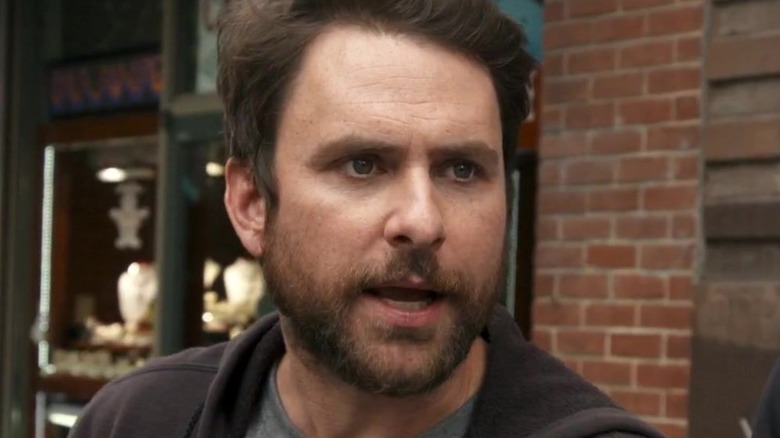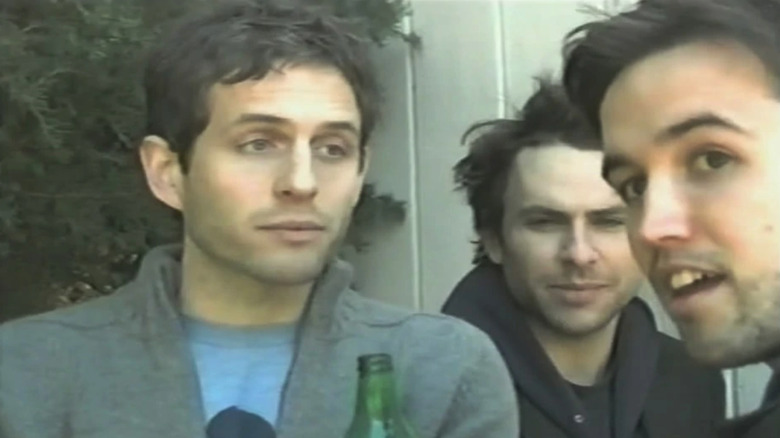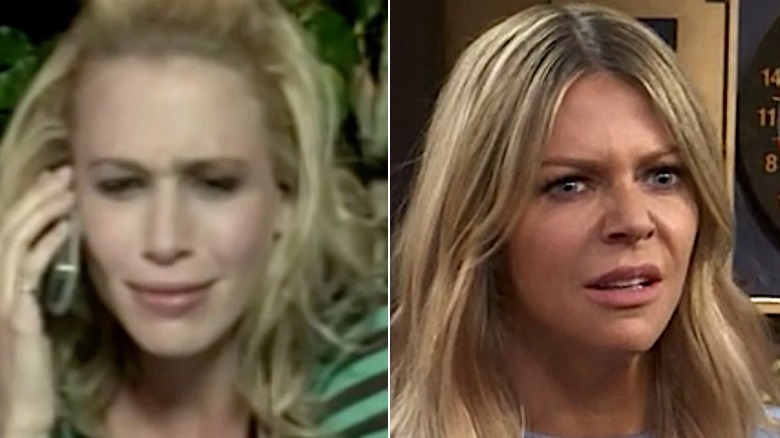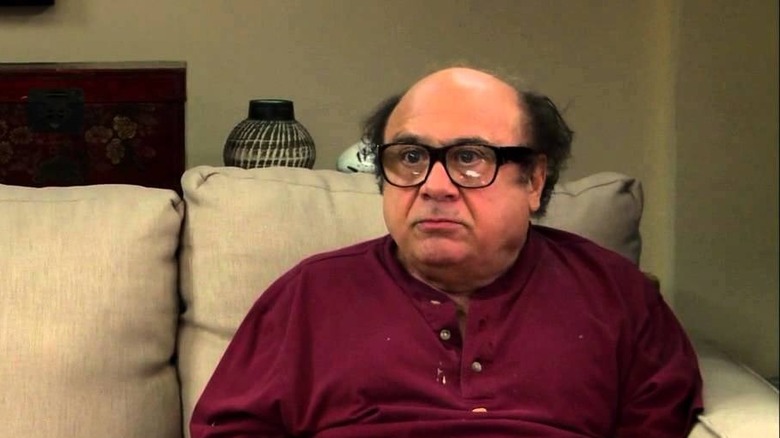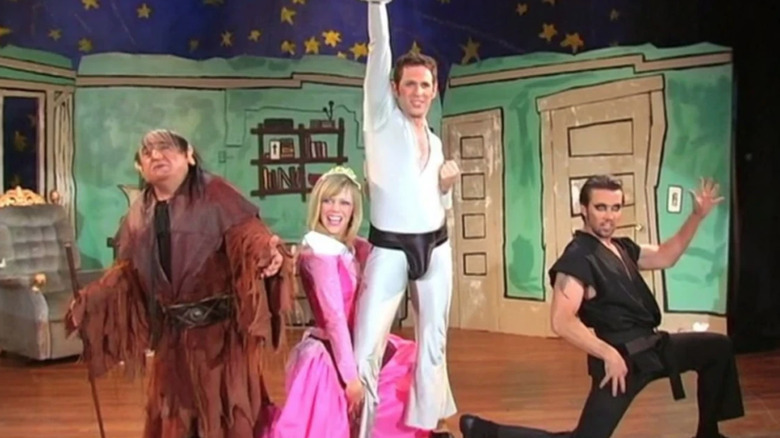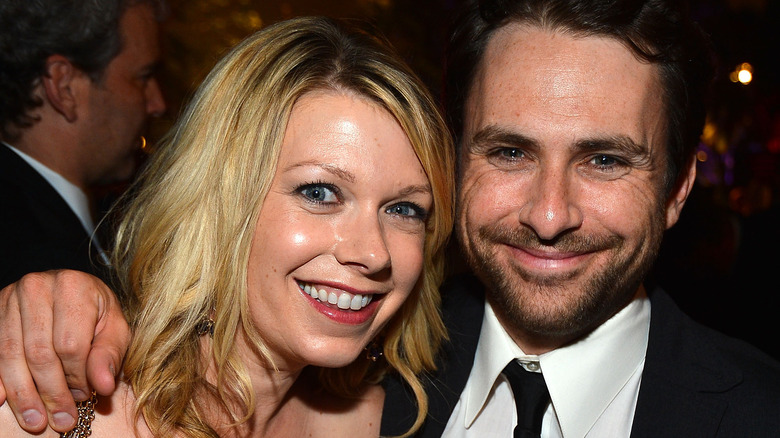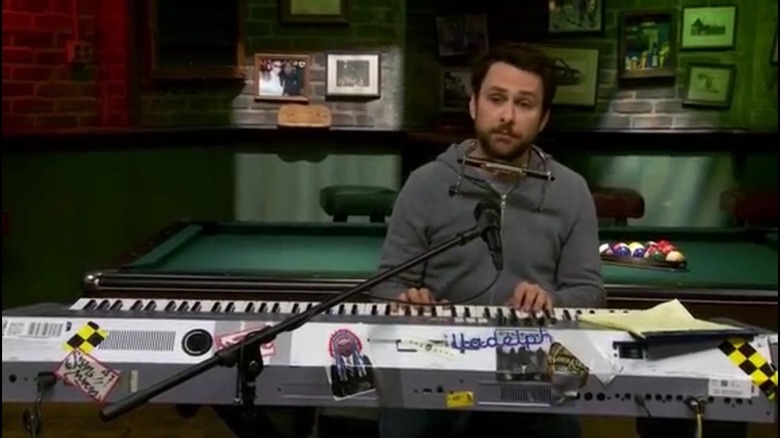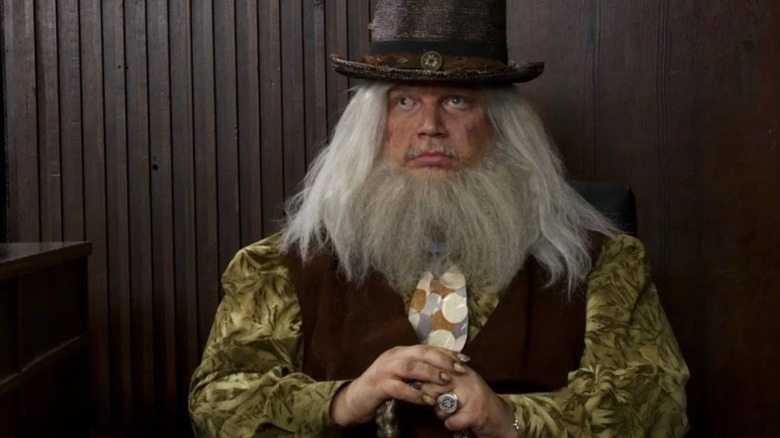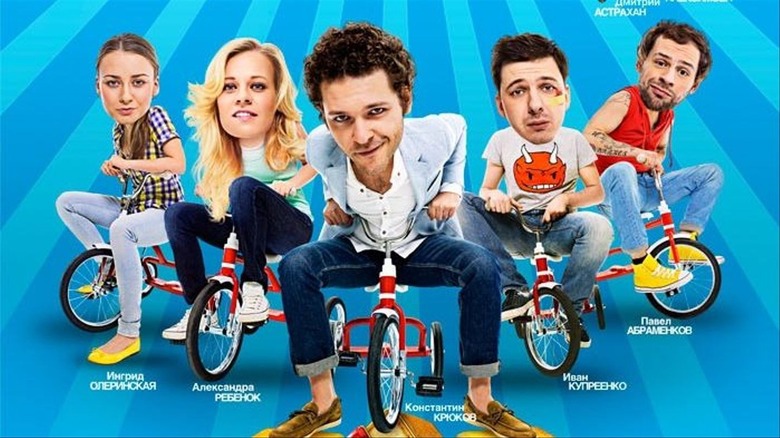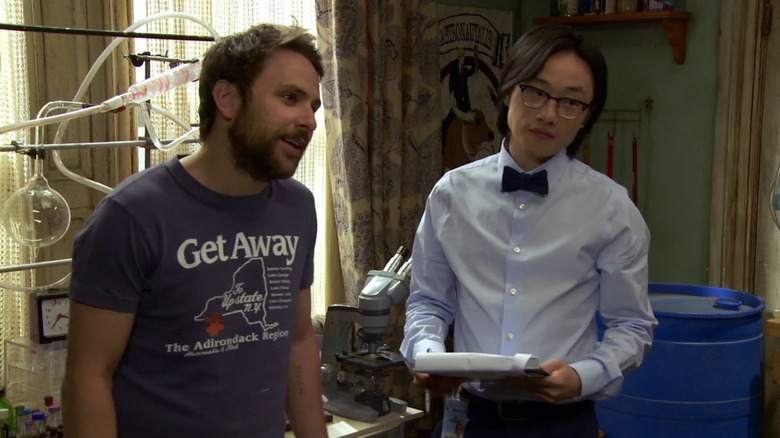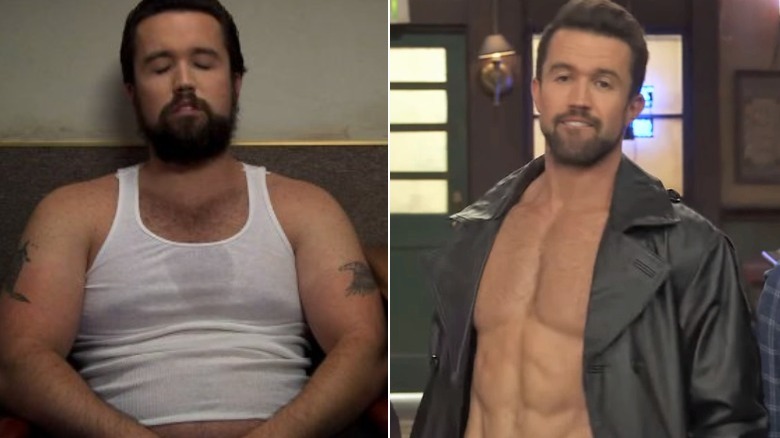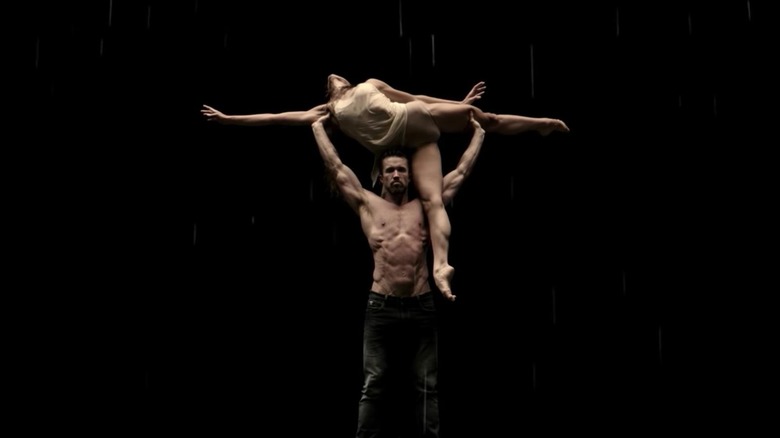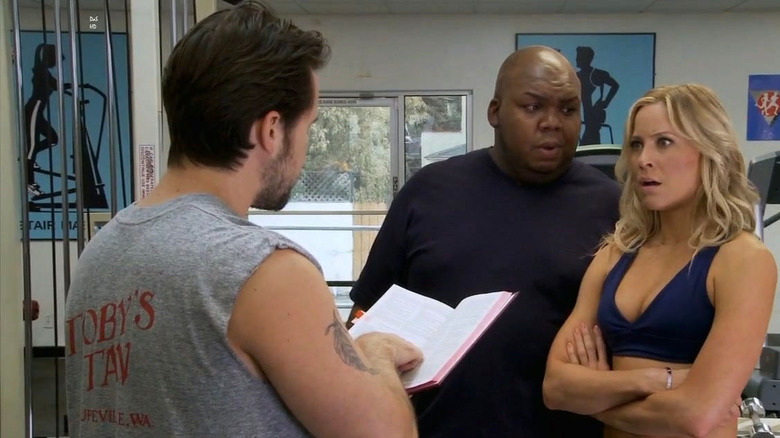The Untold Truth Of It's Always Sunny In Philadelphia
Who would have ever expected in 2005 that "It's Always Sunny in Philadelphia," a low-budget slacker comedy with mixed reviews and the most irredeemable characters imaginable, would go on to be the longest-running live-action sitcom of all time? With more than a dozen seasons under its belt and renewal up through 18 seasons, the success of the FXX series is as glorious as it is improbable. Even as broader trends in the sitcom landscape have leaned towards redemption arcs and feel-good stories, the gang at Paddy's Pub is as awful as ever, and the show is still the perfect vehicle for satirizing everything that's wrong with society.
Crude and shocking yet clever and thoughtful, "It's Always Sunny in Philadelphia" has successfully made its mark on television history. The show itself hasn't run out of stories to tell, and the success of the creators' unofficial podcast shows there's a thirst from the fans to learn more about the stories behind the scenes. Here's a list of some things every viewer should know about the history of "It's Always Sunny in Philadelphia."
The no budget pilot was about actors in Los Angeles
The original pilot for "It's Always Sunny in Philadelphia" wasn't set in Philadelphia at all but rather in Los Angeles. Titled "It's Always Sunny on TV," the episode used a plot that would later be adapted into the Season 1 episode "Charlie Has Cancer." One of the most significant differences seen in this version of the show was that the main characters were all struggling actors — reflecting the frustrations that creators Glenn Howerton, Charlie Day, and Rob McElhenney felt trying to find work.
Various low budget numbers have been thrown around about how much this pilot cost, but Charlie Day said on "The Late Show with Stephen Colbert" in 2016 that the budget was actually nonexistent, saying, "We were a bunch of kids with cameras running around shooting each other and [the] next thing you know, we're eleven years in and we're still doing the show." According to The New York Times, the FX executives liked the pilot but thought that there were too many shows about actors. McElhenney, who is from Philadelphia, came up with the new setting of Paddy's Pub.
Sweet Dee was recast and completely changed
While Glenn Howerton, Charlie Day, and Rob McElhenney would reprise their pilot roles in the series proper, the fourth and only female member of the Gang was recast. In the pilot, Sweet Dee Reynolds was played by McElhenney's then-girlfriend Jordan Reid. Reid's tell-all article in Observer about the experience describes FX as a "boys' club" that promoted her co-stars but not her to executive producer status. When she broke up with McElhenney, she was kicked off the show.
Kaitlin Olson — whom Reid has described as "lovely and talented and funnier than I could ever possibly be" — took over the role and ended up making some big changes to the character. In the pilot, Dee is the voice of reason in contrast to the chaotic misanthropy of Dennis, Charlie, and Mac. Olson explained in an interview with Yahoo! News that she almost refused to take this relatively boring role and was able to push the writers to develop Dee into someone just as hilariously messed up as the boys.
Danny DeVito saved the show from cancelation
Fans and critics generally agree that "It's Always Sunny in Philadelphia" significantly improved in its second season with the introduction of Frank Reynolds, Dennis and Dee's wealthy, depraved father played by Danny DeVito. Of the five lead actors in the Paddy's Pub gang, DeVito is the only one who was famous before the show existed — which is both why FX president John Landgraf wanted him to join the cast and why Rob McElhenney initially did not want him involved.
In an interview on "The Late Show with Stephen Colbert" in February 2020, McElhenney explained that Season 1's ratings were incredibly low and Landgraf suggested DeVito, a friend of his, as a big name who could bring in more viewers. McElhenney initially feared this would hurt the show's small, scrappy energy, saying, "We thought we had something really special, and we really thought that maybe bringing a movie star on would ruin the chemistry." He quickly changed his tune when Landgraf threatened to cancel the show if they didn't add DeVito. It all worked out in the end, with DeVito proving a perfect match for the group's chemistry and a contributing factor to its long-term success.
The Nightman Cometh got a live stage production
Poll any random group of "It's Always Sunny in Philadelphia" fans on Reddit what their favorite episode is and you're sure to find a lot of people answering "The Nightman Cometh." This Season 4 episode involves Charlie writing a full-blown musical about his Dayman and Nightman characters for the Gang to perform. In classic "It's Always Sunny in Philadelphia" fashion, things meant to be innocent come off as extremely dirty and disturbing, things intended to be spectacular end up laughably silly, and, of course, there's an ulterior motive to the whole enterprise.
So instantly popular was "The Nightman Cometh" that a last-minute invite to perform at the songs at the Troubadour theatre resulted in two sold-out performances and an invite from Live Nation to tour the full musical around 30 cities (via GQ). The cast ultimately agreed to perform it in just six cities — New York, Los Angeles, San Francisco, Seattle, Boston, and Philadelphia. To flesh it out to a full show, additional songs and scenes were written, and the Los Angeles performance was recorded for a bonus feature on the Season 4 DVD.
Many of the stars are married to each other
From the very beginning of the series, Charlie Kelly has been stalking a woman he only knows as "The Waitress." In reality, the actor who plays Charlie (Charlie Day) and the actress who plays the Waitress (Mary Elizabeth Ellis) have been married since 2006 and have been dating since at least 2004, as they revealed in an interview with Monster Fresh.
Day and Ellis were the first "It's Always Sunny in Philadelphia" regulars to get married to each other, but they weren't the only ones. Two years later, in 2008, Rob McElhenney and Kaitlin Olson wed. McElhenney told "WTF with Marc Maron" that he and Olson first developed romantic feelings for each other during the production of "It's Always Sunny in Philadelphia" Season 2. Olson's first pregnancy was worked into the plotline of Season 6 and the season finale, "Dee Gives Birth," is dedicated to her and McElhenney's son Axel Lee McElhenney.
Other actors' spouses have made cameos in the show. In Season 5's "The D.E.N.N.I.S. System," Glenn Howerton's wife, Jill Latiano, plays Caylee, a pharmacist who is subjected to Dennis' infamous system to woo and abandon women. Danny DeVito's ex-wife Rhea Perlman never appeared in the show itself, but she got involved in the series in her own way when she played Gladys in the live stage version of "The Nightman Cometh."
It's only been nominated in one Emmy category
For all the love "It's Always Sunny in Philadelphia" has earned over the years, the Emmy Awards have never shown the series any. Over 15 seasons, the show has only been nominated three times, all in the same category: outstanding stunt coordination for a comedy series or a variety program, in 2013, 2014, and 2015. At the very least, the cinematography of "Charlie Work" or the choreography of "Mac Finds His Pride" should have been more than Emmy-worthy, but the show continues to be ignored.
The show itself made fun of this lack of awards success in the Season 9 episode "The Gang Tries Desperately to Win an Award." The episode involves Paddy's Pub trying to compete for the Annual Bar Association Awards, a clear analog for the Emmys. Philly's other award-winning bars, which they unsuccessfully try to imitate, serve as parodies of cheesy laugh track-heavy network sitcoms and raunchy yet "classy" HBO prestige series. The episode ends with Charlie memorably singing, "I don't need your trophies or your gold, I just want to tell you all go f*** yourselves."
Why Guillermo Del Toro guest-starred
Oscar-winning director Guillermo Del Toro has guest-starred in two "It's Always Sunny in Philadelphia" episodes, Season 8's "The Maureen Ponderosa Wedding Massacre" and Season 11's "McPoyle vs. Ponderosa: The Trial of the Century." Both times he appears as Pappy McPoyle, the appropriately disgusting patriarch of the McPoyle family. Del Toro appeared on the show because he's a huge fan — such a huge fan, in fact, that he cast Charlie Day as the scientist Newton Geiszler in "Pacific Rim" based entirely on Day's acting in one particular "It's Always Sunny in Philadelphia" episode.
Day explained the situation while promoting "Pacific Rim" on "Late Night with Jimmy Fallon" in 2013 (via MTV), saying, "I got a call from Guillermo Del Toro, the director. Apparently, he's a huge 'Sunny' fan. There was an episode where I was bashing rats called 'Charlie Kelly: King of the Rats,' and I was like haunted from murdering rats, and he said to himself, 'That's my guy. That guy should be in my next movie because he killed the rats, he can kill the monster.'" With Del Toro and Day working together on the movie, the director specifically asked the actor for "the most demeaning cameo" he could give him in "It's Always Sunny in Philadelphia."
There was a Russian remake
Even the most dedicated fans of "It's Always Sunny in Philadelphia" might not be aware that the series received a Russian remake, titled "It's Always Sunny in Moscow." The remake, about people running a bar named Philadelphia, premiered in 2014 on TNT Russia (no relation to the WarnerMedia-owned TNT network in the US). Unlike its source material, "It's Always Sunny in Moscow" did not last beyond a single season of 16 episodes.
With no official translation released, finding discussion of the remake on the English-language internet is tough. Based on its extremely low IMDb ratings and translations of Russian reviews from My City Paper, the general consensus among those who have seen it appears to be predominantly negative. The episodes were remakes of ones from the first three seasons of "It's Always Sunny in Philadelphia," with the humor making little sense outside of its original cultural context and subject to heavy censorship.
Game of Thrones showrunners wrote an episode
David Benioff and D.B. Weiss might have become controversial figures since the ending of "Game of Thrones" went wrong, but in 2013, news that they would be writing an episode of "It's Always Sunny in Philadelphia" was greeted with excitement rather than dread. Season 9's "Flowers for Charlie," a "Flowers for Algernon" parody where Charlie takes part in an experiment he thinks increases his intelligence, is proof that even if they have issues ending epic dramas, Benioff and Weiss are surprisingly good comedy writers.
The connection between "Game of Thrones" and "It's Always Sunny in Philadelphia" goes beyond this one episode. Matt Shakman, who directed 43 episodes of "It's Always Sunny in Philadelphia," went on to direct two episodes of "Game of Thrones" Season 7. Entertainment Weekly reported that according to the book "Fire Cannot Kill a Dragon," Benioff and Weiss pranked Rob McElhenney by pretending Shakman was doing a bad job. The "Game of Thrones" showrunners also made cameos as bored lifeguards in the Season 12 episode "The Gang Goes to a Water Park."
How Rob McElhenney pulled off two transformations
In most sitcoms, characters often get more and more conventionally attractive as the series progress. But the "It's Always Sunny in Philadelphia" ethos is to do the opposite of what a conventional sitcom would do, and so in Season 7, Rob McElhenney decided to rapidly gain 60 pounds for a storyline in which Mac thinks he's building muscle mass but is actually just gaining weight. In an interview with Nick Kroll for The Wrap, McElhenney detailed the 5,000-calorie-a-day diet he used to gain this weight and how he rapidly lost it after filming the season.
In Season 13, Mac actually did gain a ton of muscle. For most of the season, this is just an inexplicable visual gag. However, the season finale, "Mac Finds His Pride," revealed what this transformation was all about: performing Mac's shockingly moving dance performance where he comes out to his dad. McElhenney explained and joked about this transformation on Instagram, listing off all the forms of extreme training he had to do before sarcastically saying, "I don't know why everyone's not doing this. It's a super realistic lifestyle and an appropriate body image to compare oneself to."
Mac's coming out had personal resonance
Over the many years, Mac's sexuality evolved from being intentionally ambiguous to an obvious punchline before eventually becoming something he'd actually come out about and embrace. The decision to make Mac gay and deeply closeted, Rob McElhenney explained to Rolling Stone, was a dig at the hypocrisy of homophobic religious conservatives. In the Season 11 two-part finale, "The Gang Goes to Hell," Mac temporarily comes out as gay, only to take it back afterward. In Season 12's "Hero or Hate Crime?" Mac finally comes out for real, and Season 13's "Mac Finds His Pride" displays surprising emotional resonance in his struggle with his sexuality and faith.
McElhenney doesn't identify as gay himself, but speaking to Deadline, he explained his personal connection to the LGBTQ+ community and how that influenced this storyline. McElhenney said, "I was partly raised by two women, and I have two brothers who are gay, so I have always been part of the gay community. It's just always been a part of my life." The actor continued, "Mac was showing a lot of signs of being a closeted homosexual, and it could be interesting to have him come out ... And, yes, it was something that was important to me."
Regrets over ableist and transphobic language
"It's Always Sunny in Philadelphia" has been surprisingly successful in being offensive without genuinely being offensive, but as sensitivities change, some elements of earlier episodes don't hold up. While the show has always had its heart in the right place by making it clear that the gang is composed of individuals who are all supposed to be terrible people, many of the stars regret how flippantly some episodes used certain ableist and transphobic language.
Speaking to GQ in 2018, Glenn Howerton said one of his "few regrets" was the title of the Season 3 episode that uses a derogatory term for individuals with mental disabilities. Changing sensitivities around ableist language can be seen in Season 13's meta episode "The Gang Does a Clip Show," where flippant uses of offensive terms in older footage are now bleeped out. Rob McElhenney expressed similar regrets to Showbiz Cheat Sheet in 2020 about the language used in early episodes to describe the transgender character Carmen. McElhenney said, "We referred to [her] in a derogatory term which at the time we didn't recognize was derogatory and that's our own fault and ignorance because we didn't do our homework and reach out to the community to find out."
Five episodes were pulled from streaming
No aspect of "It's Always Sunny in Philadelphia," however, has been more controversial than the show's usage of blackface, brownface, and yellowface. The intent was satirical for the purposes of showing just how wrong and out of touch these characters are. Still, it's seriously questionable whether that intent makes up for the sheer offensiveness of the actors putting on such makeup in the first place.
In June 2020, when streaming services were pulling multiple blackface sitcom episodes from circulation, five offending episodes of "It's Always Sunny in Philadelphia" were among those pulled. The episodes removed included Season 4's "America's Next Top Paddy's Billboard Model Contest," Season 6's "Dee Reynolds: Shaping America's Youth," Season 8's "The Gang Recycles Their Trash," Season 9's "The Gang Makes Lethal Weapon 6," and Season 14's "Dee Day." "Dee Day" was also not included in the Season 14 DVD box set, as noted in customer reviews on Reddit. As of August 2021, "America's Next Top Paddy's Billboard Model Contest" was quietly re-added to Hulu.
When "It's Always Sunny in Philadelphia" returned for Season 15 in December 2021 after a lengthy hiatus, it addressed the controversy in the funniest way it could — with the episode "The Gang Makes Lethal Weapon 7." In the episode, the Gang finds their previous blackface-heavy "Lethal Weapon" sequels have been removed from the local library, so they attempt to make up for it with a new "woke" sequel. Even when they're trying to be progressive, the Gang's extreme ignorance and selfishness make a hilarious mess of things.
